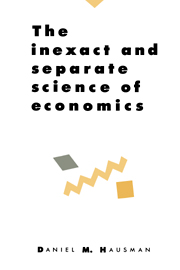Book contents
- Frontmatter
- Contents
- List of figures
- Dedication
- Introduction
- Part I Introduction, structure, and strategy
- 1 Rationality and utility theory
- 2 Demand and consumer choice
- 3 The theory of the firm and general equilibrium
- 4 Equilibrium theory and economic welfare
- 5 Models and theories in economics
- 6 The structure and strategy of economics
- 7 Overlapping generations: a case study
- Part II Theory assessment
- Part III Conclusion
- Appendix: An introduction to philosophy of science
- Bibliography
- Index
5 - Models and theories in economics
Published online by Cambridge University Press: 04 August 2010
- Frontmatter
- Contents
- List of figures
- Dedication
- Introduction
- Part I Introduction, structure, and strategy
- 1 Rationality and utility theory
- 2 Demand and consumer choice
- 3 The theory of the firm and general equilibrium
- 4 Equilibrium theory and economic welfare
- 5 Models and theories in economics
- 6 The structure and strategy of economics
- 7 Overlapping generations: a case study
- Part II Theory assessment
- Part III Conclusion
- Appendix: An introduction to philosophy of science
- Bibliography
- Index
Summary
Chapters 1–4 presented fundamental neoclassical theory – “equilibrium theory” – and explored how it is incorporated into partial and general equilibrium theories. The discussion showed how recourse to theory unifies and systematizes empirical generalizations, and it provided some of the flavor of theoretical work in microeconomics, general equilibrium theory, and welfare economics. We caught some glimpses of the challenging task of reformulating relevant parts of equilibrium theory, common simplifications, and specifications of the epistemological, institutional, and other circumstances so as to deduce enlightening theorems. We witnessed the significance and centrality of the theoretical enterprise of neoclassical economics.
But we did not comprehend that enterprise in a philosophically satisfying way, for nothing was said to connect the description of theoretical practice in microeconomics, general equilibrium theory, and welfare economics to general philosophical theses concerning the nature, role, and importance of theories in science. Indeed the discussion in the previous chapters has probably also been jarring to economists with its old-fashioned talk of laws and theories. For economists prefer to speak of “models” rather than “theories” and of “behavioral postulates” rather than “laws.” Why? What are models and how are they related to theories? Should one not regard their central clauses or generalizations as laws?
My view of theories and models and of global theory structure in economics is controversial. I hope to show that it helps one to understand how economists theorize.
- Type
- Chapter
- Information
- The Inexact and Separate Science of Economics , pp. 70 - 82Publisher: Cambridge University PressPrint publication year: 1992



